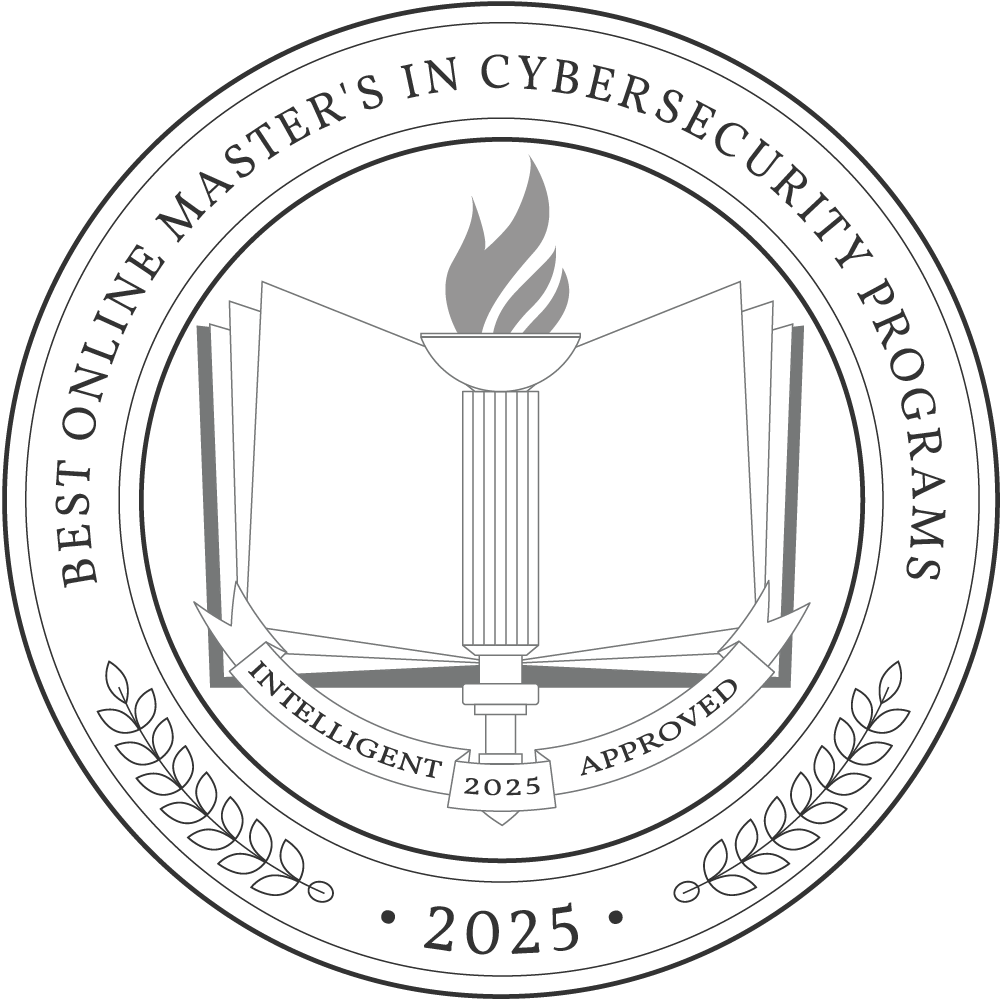Students pursuing an online master’s in cybersecurity will profoundly increase their knowledge of information technology and computer security and gain technical mastery of the skills needed to stay on the cutting edge in this field.
Most cybersecurity master’s programs last between 30 to 33 credit hours. Students can earn their master’s degree in as little as one year.
The average cost of tuition for a master’s degree program is $20,513 per year. After graduating from their cybersecurity program, students will be qualified to work as information security analysts and earn an average salary of $112,000 per year.
Why Trust Us
The Intelligent.com Higher Education Team is dedicated to providing students with independent, equitable school and program rankings and well-researched resources. Our expert-driven articles cover topics related to online colleges and programs, paying for school, and career outlooks. We use data from the U.S. Department of Education’s College Scorecard, the National Center for Education Statistics, and other reputable educational and professional organizations. Our academic advisory team reviews content and verifies accuracy throughout the year for the most current information. Partnerships do not influence rankings or editorial decisions.
- Analyzed over 2,000 national, accredited, and nonprofit colleges and universities
- 800+ rankings pages are reviewed and updated yearly
- Content is informed by reputable sources, surveys, and interviews with academic advisors and other experts
- Over 100 data points are reviewed for accuracy and quality throughout the year, including sources
How we rank schools
Our list features the best online Cyber Security degree programs at top colleges nationwide. Each school featured is a nonprofit, accredited institution — either public or private — with a high standard of academic quality for post-secondary institutions.
We evaluated each school’s program on tuition costs, admission, retention and graduation rates, faculty, reputation, and the student resources provided for online students. We collected data from trusted sources like the National Center for Education Statistics, individual school and program websites, school admissions counselors, and other data sources. Then, we calculated the Intelligent Score on a scale of 0 to 100 based on the following criterion:
Academic Quality:
- Admission rate versus enrollment rate
- Retention rate of students who return after year one
- Accreditation status (regional and programmatic)
- Nonprofit status, both private and public institutions
Graduation Rate
- Overall graduation rate
- Total number of currently enrolled students, including diversity metrics
- Student-to-faculty ratio
Cost and ROI
- In-state and out-of-state per-credit tuition rates and fees
- Required credits to graduate
- Earning potential after graduation
- Availability of federal student loans, scholarships, and other financial aid options
Student Resources
- Available student services for online-only and hybrid programs
- On-campus amenities like tutoring centers and the number of libraries
Read more about our ranking methodology.
Best 50 Accredited Online Master’s in Cybersecurity Programs
FiltersInstitution Type
Status
- Intelligent Score
- Alphabetically By University Name
- Acceptance Rate
- Enrollment
- In-state Graduate Tuition
- Out-of-state Graduate Tuition
- In-state Undergraduate Tuition
- Out-of-state Undergraduate Tuition

Johns Hopkins Engineering for Professionals
Intelligent Score: 99.64In-state: $54,160
Out-of-state: $54,160
In-state: $57,010
Out-of-state: $57,010
SAT: 1470-1560
ACT: 34-36
$1,757
Online, On-Campus, Hybrid
Middle States Commission on Higher Education
30

Georgia Tech
Intelligent Score: 97.85In-state: $28,106
Out-of-state: $49,218
In-state: $27,898
Out-of-state: $27,898
SAT: 1370-1530
ACT: 31-35
$335
Online, On-Campus
Southern Association of Colleges and Schools Commission on Colleges
32

George Washington University
Intelligent Score: 97.58In-state: $55,961
Out-of-state: $55,961
In-state: $31,770
Out-of-state: $31,770
SAT: 1270-1450
ACT: 30-33
$1,200
Online
Middle States Commission on Higher Education
30

University of Illinois Springfield
Intelligent Score: 96.76In-state: $14,317
Out-of-state: $33,824
In-state: $15,016
Out-of-state: $15,016
SAT: 1200-1460
ACT: 27-33
$509
Online, On-Campus, Hybrid
Higher Learning Commission
30

University of Central Missouri
Intelligent Score: 96.75In-state: $7,128
Out-of-state: $14,256
In-state: $7,608
Out-of-state: $7,608
SAT: N/A
ACT: 19-25
$425
Online, On-Campus
Higher Learning Commission
30

Georgetown University
Intelligent Score: 96.53In-state: $57,384
Out-of-state: $57,384
In-state: $53,136
Out-of-state: $53,136
SAT: 1380-1550
ACT: 31-35
$1,573
Online, On-Campus
Middle States Commission on Higher Education
33

Capitol Technology University
Intelligent Score: 96.10In-state: $25,830
Out-of-state: $25,830
In-state: $11,390
Out-of-state: $11,390
SAT: N/A
ACT: N/A
$630
Online
Middle States Commission on Higher Education
36-39

Northeastern University
Intelligent Score: 95.52In-state: $54,360
Out-of-state: $54,360
In-state: $25,264
Out-of-state: $25,264
SAT: 1410-1540
ACT: 33-35
$1,682
Online, On-Campus
New England Commission of Higher Education
32

Nova Southeastern University
Intelligent Score: 94.00In-state: $32,370
Out-of-state: $32,370
In-state: $20,618
Out-of-state: $20,618
SAT: 1030-1240
ACT: 20-27
$979
Online, On-Campus
Southern Association of Colleges and Schools Commission on Colleges
30

Hood College
Intelligent Score: 93.89In-state: $41,680
Out-of-state: $41,680
In-state: $8,820
Out-of-state: $8,820
SAT: N/A
ACT: N/A
$510
Online, On-Campus
Middle States Commission on Higher Education
30

Illinois Institute of Technology
Intelligent Score: 93.67In-state: $48,610
Out-of-state: $48,610
In-state: $29,075
Out-of-state: $29,075
SAT: 1200-1390
ACT: 26-32
$1,780
Online, On-Campus
Higher Learning Commission
30

Regis University
Intelligent Score: 93.42In-state: $38,208
Out-of-state: $38,208
In-state: $14,322
Out-of-state: $14,322
SAT: 1000-1220
ACT: 21-28
$976
Online, On-Campus
Higher Learning Commission
36

University of West Florida
Intelligent Score: 93.20In-state: $3,735
Out-of-state: $16,004
In-state: $7,088
Out-of-state: $7,088
SAT: 1060-1230
ACT: 21-27
$425
Online, On-Campus
Southern Association of Colleges and Schools Commission on Colleges
30

Webster University
Intelligent Score: 92.25In-state: $28,500
Out-of-state: $28,500
In-state: $13,500
Out-of-state: $13,500
SAT: 1078-1260
ACT: 20-27
$730
Hybrid
Higher Learning Commission
36

University of Dallas
Intelligent Score: 91.25In-state: $41,660
Out-of-state: $41,660
In-state: $33,750
Out-of-state: $33,750
SAT: 1130-1350
ACT: 23-30
$1,300
Online
Association to Advance Collegiate Schools of Business
30

Fordham University
Intelligent Score: 91.04In-state: $54,730
Out-of-state: $54,730
In-state: $23,112
Out-of-state: $23,112
SAT: 1230-1410
ACT: 27-32
$1,732
Online, On-Campus, Hybrid
Middle States Commission on Higher Education
30

University of San Diego
Intelligent Score: 89.68In-state: $52,120
Out-of-state: $52,120
In-state: $27,936
Out-of-state: $27,936
SAT: N/A
ACT: N/A
$1,290
Online, On-Campus
Western Association of Schools and Colleges Senior College and University Commission
30

Pace University
Intelligent Score: 89.60In-state: $45,832
Out-of-state: $45,832
In-state: $32,256
Out-of-state: $32,256
SAT: 1060-1240
ACT: 22-28
$1,210
Online, On-Campus
Middle States Commission on Higher Education
30-39
How to Choose an Online Master’s in Cybersecurity Program
Choose your area of study
A cybersecurity master’s degree is typically offered as a Master of Science (MS). Depending on the online master’s in cybersecurity programs that students apply to, they may be able to choose from several concentrations. These specialized areas of study may include cyber operations, cyber threat intelligence, information systems, information technology, network security, and risk management.
If prospective students already have a good idea of what career they wish to pursue after graduation, it’s advisable to choose a cybersecurity program and an area of study where they can learn the most relevant knowledge. This helps ensure the student is best prepared for their chosen career path after successful completion of their cybersecurity master’s program.
Research schools and programs
Many different schools offer an online master’s in cybersecurity program, so prospective students need to develop specific criteria that narrow down the list of possible schools.
You should only consider institutions that have been approved by a DOE-recognized accrediting organization, such as the New England Commission of Higher Education or Northwest Commission on Colleges and Universities. These organizations evaluate schools to ensure they provide students with a high-quality education. Those who attend a school that isn’t accredited may be unable to access financial aid or transfer credits to another institution if needed.
It’s also important to consider how expensive the cybersecurity program will be, and students who need additional academic support should explore if the schools in question offer any special tutoring or other support services for online students who may need help with their studies.
To learn more about any cybersecurity master’s programs that you’re interested in, you can visit the school’s website, contact an admissions counselor, follow the school on social media, or attend an in-person or virtual open house.
Prepare for tests and applications
Each cybersecurity master’s program has its own set of application requirements.
Most online master’s in cybersecurity programs do not require standardized test scores from the Graduate Record Examinations (GRE) or Graduate Management Admission Test (GMAT), though submitting GMAT scores may improve the odds of getting admitted to a more competitive cybersecurity program. Online cybersecurity master’s students doing so should be very wary of application deadlines because it can take up to three months to study for the GMAT and up to 20 days to receive test results.
Prospective advanced degree students should verify whether the applications also require them to submit additional paperwork. This paperwork typically includes undergraduate transcripts but may also consist of application essays, letters of recommendation, and a personal statement. If so, students should ensure they have enough time to obtain these materials before applying.
Before submitting an application to a cybersecurity program, always contact an admissions counselor to make sure you have the most accurate information regarding requirements and deadlines.
Select your program
Even if students choose to apply to multiple online master’s in cybersecurity programs, they will need to develop additional criteria to determine which schools to apply to and which schools to skip.
For example, cost remains a primary consideration because no online cybersecurity master’s students want to graduate with a large amount of debt. Aspiring cybersecurity professionals who are especially worried about debt should focus on schools that offer additional scholarships, grants, or assistantships to qualifying graduate students.
Students may also focus on online degree programs with classes taught by professors who are influential in the field of cybersecurity. The right professors can help students learn more and may have the most relevant advice about getting a job within the industry.
Before making your final decision, review your needs and goals again. Do you plan to attend school full-time or part-time? Do you want your cybersecurity program to be as online as possible, or are you fine with a hybrid program that has a fair amount of in-person requirements? Some cybersecurity master’s degree programs offer asynchronous courses, which can be completed at your own pace, while others only offer synchronous courses, which are interactive classes taught remotely to a group of students in real-time — which of these two learning formats do you prefer? Your online master’s program should accommodate your scheduling needs and learning preferences.
Determine how you’ll pay for your degree
Filling out the Free Application for Federal Student Aid (FAFSA) each academic year is essential for those earning an online degree. The FAFSA will qualify students for federal loans and may help them to qualify for additional grants and scholarships.
Students should contact the financial aid offices of any schools they are interested in attending and ask about aid opportunities to verify they have explored all possible financial aid options. Those who already work in the field should see if their employer offers tuition assistance benefits as well.
What Can You Expect from an Online Master’s in Cybersecurity Program?
Online master’s in cybersecurity programs are designed to challenge and engage students who already have a strong level of computer and information technology knowledge. Accordingly, students entering a cybersecurity master’s degree program should expect courses that heavily concentrate on developing or furthering skills in information systems, information security, network security, computer science fundamentals, machine learning, cyber operations, and more.
Some cybersecurity master’s degree programs will also foster skills in systems security management, which is helpful because graduating students often obtain senior-level positions in highly-technical fields.
Depending on the chosen concentrations or electives, students may learn more about specialized fields such as cyber forensics. This can help prepare graduates to be generalists within the information technology world or to specialize in an area they are particularly passionate about.
Cybersecurity master’s degree programs typically take full-time students two years to complete. Earning online master’s degrees part-time is possible, though this means it will take longer than two years to finish. Alternatively, students may focus on accelerated master’s degree programs that allow them to complete coursework in just one year.
Potential courses you’ll take in an online master’s in cybersecurity degree program
Foundations of Algorithms
This course provides foundational knowledge of algorithms, including their history (they have been around for nearly a millennium) and modern application. Algorithms are the cornerstone of modern computing, and students will learn about the algorithms that power cybersecurity for individuals and organizations worldwide.
Artificial Intelligence
This course helps students learn more about the ever-growing field of artificial intelligence, including the fundamentals of neural networking and the practical application of AI within cybersecurity. Students will need to already have a high level of programming knowledge to be successful in this class.
Data Processing at Scale
This course offers students a closer look at cutting-edge ways to process large-scale datasets, which can be helpful in the creation and maintenance of robust databases. Students will learn more about the use of scalable data and how such data is integral to any business hoping to reach its full potential.
Mobile Computing
This course helps students learn more about all aspects of mobile computing, including app development, mobile technology management, wireless communication, and more. Because most people now access the internet via mobile devices, deep knowledge of mobile computing has become critical for any cybersecurity expert.
What Can You Do With an Online Master’s in Cybersecurity Degree?
Career outlook
The career outlook for individuals with a master’s degree in cybersecurity is exceptionally promising. Cybersecurity professionals are in high demand due to the increasing frequency and complexity of cyber threats.
Some of the possible career paths for cybersecurity professionals include the following:
- Information security analyst — Monitor networks, identify vulnerabilities, train staff on how to prevent security breaches, and recommend security upgrades.
- Median annual salary: $112,000
- Projected employment growth (through 2032): 32%
- New job openings projected: 16,800 annually
- Information systems manager — Assess an organization’s technology needs, plan IT projects, and hire and supervise IT staff.
- Median annual salary: $164,070
- Projected employment growth (through 2032): 15%
- New job openings projected: 46,900 annually
- Computer network architect — Design, implement, and upgrade data communication networks.
- Median annual salary: $126,900
- Projected employment growth (through 2032): 4%
- New job openings projected: 10,200 annually
Online Master’s in Cybersecurity Degree Frequently Asked Questions
How do I apply to an online master’s in cybersecurity degree program?
The best way to apply for an online master’s in cybersecurity degree is through the university website. Students can apply directly online, and the application will specify if students must include things like GMAT test scores, letters of recommendation, application essays, and undergraduate transcripts.
It’s important to review each application carefully because some programs may have specific requirements that others do not. If there are questions about application requirements or anything related to the cybersecurity master’s program, students should contact an admissions advisor for any schools they are interested in.
How much does an online master’s in cybersecurity degree cost?
Graduate school tuition costs $20,513 per year on average. Public schools are almost always more affordable than private ones. And at public schools, in-state students are usually charged lower tuition rates than out-of-state students.
How long does it take to earn an online master’s in cybersecurity degree?
It typically takes full-time students two years to earn an online master’s in cybersecurity degree. If such students only attend classes part-time, earning the degree may take three years or longer. Alternatively, if a student takes an accelerated program, they may be able to complete all required coursework in only one year. While it is often tempting to complete coursework as quickly as possible, students who have other responsibilities (including a career and a family) should focus on finding programs flexible enough to meet their unique scheduling needs.
Is an online master's in cybersecurity worth it?
The field of cybersecurity is experiencing significant growth, and the demand for skilled professionals far exceeds the supply. This degree opens doors to a wide range of career paths, from security analysis to leadership roles. Graduates with a master’s in cybersecurity often command higher salaries than those with only a bachelor’s degree, given their specialized knowledge and expertise.
Professionals with a master’s in cybersecurity are well-equipped to address compliance requirements and manage security risks effectively. They play a vital role in safeguarding an organization’s digital assets, ensuring the confidentiality, integrity, and availability of critical information.
Earning your degree online can be an excellent choice for some students. Online programs offer the flexibility to access course materials and lectures at your convenience, which can be beneficial for those with other professional or personal commitments. Online programs attract a diverse student body from around the world, which can offer opportunities to network and collaborate with individuals from various backgrounds and skill levels.

